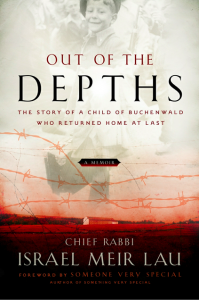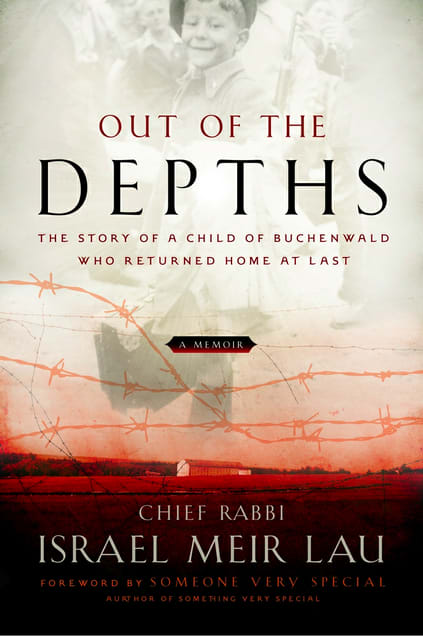Out of the Depths: The Story of a Child of Buchenwald Who Returned Home at Last
A Memoir by Chief Rabbi Israel Meir Lau Forewords by Shimon Peres and Elie Wiesel. Sterling/OU Press, 380 pages.
 In this riveting and emotionally-charged memoir, the former Chief Ashkenazi Rabbi of Israel relates the turbulent yet hopeful story of his life with unfailing honesty. Beginning with his earliest memories as a child of five thrown into the horrific maelstrom of the Nazi Holocaust through his election to the highest rabbinical post in Israel, Rabbi Israel Meir Lau chronicles his unlikely survival and success amidst cruelty and unmitigated hardship with eloquence and passion.
In this riveting and emotionally-charged memoir, the former Chief Ashkenazi Rabbi of Israel relates the turbulent yet hopeful story of his life with unfailing honesty. Beginning with his earliest memories as a child of five thrown into the horrific maelstrom of the Nazi Holocaust through his election to the highest rabbinical post in Israel, Rabbi Israel Meir Lau chronicles his unlikely survival and success amidst cruelty and unmitigated hardship with eloquence and passion.
Saved by his mother, who at the very last moment flung him from a doomed women’s train into his brother Naphtali’s arms, young Israel Meir is charged with retaining and rekindling the flame of his family’s rabbinic dynasty. Descended from an uninterrupted chain of twenty eight generations of rabbis, Lau realized that more than just the fate of a small boy was at stake when he managed to miraculously stay alive.
Thanks in large part to Naphtali’s single-minded devotion and courage, Israel Meir was a haunting anomaly as an eight year old survivor of Buchenwald. Naphtali continually risked his own life as he rescued and hid Israel Meir countless times throughout the war, most notably when he climbed from train car to train car to locate and ultimately save his young brother and when he concealed him in his sack to keep him close and hidden. At war’s end, as the brothers healed and regrouped, they knew without a shadow of doubt where they were headed: Eretz Israel.
Perhaps one of the most poignant scenes in the memoir is of Israel Meir at war’s end. Holding a small old suitcase given to him by an American soldier who liberated Buchenwald, the child survivor begins his return to the land of the living. A picture taken of Israel Meir at the time, in which he is wearing a Hitler Youth uniform (there were no other clothes available), clutching this suitcase and holding a rifle (also given to him by a soldier) hangs near the doorpost of his home now, beside a mezuzah. He explains that “together these symbols surround me, forming my entire world. Every time I look at the photograph, it tells me: Israel Meir, you have a mission – to justify your survival and your existence; to serve as the messenger of your murdered father, mother, and brother; and to continue the dynasty.”
To this end, Rabbi Lau marks every speech he makes with a commemoration of those slain in the Holocaust and an exhortation to never forget. His first experience with the Hebrew language was with the words of the Kaddish prayer, as a child orphan in a French displaced persons camp. As Israel’s most recognized Jewish spiritual leader, throughout his many encounters with leaders of other faiths around the world who offer him pleas for forgiveness, Rabbi Lau extends feelings of appreciation for their apologies, but never forgives. After all, he says, who is he to forgive grave sins executed toward an entire nation?
As Rabbi Lau continues on his journey to adulthood, first as a yeshiva student living with his aunt and uncle, Rabbi and Mrs. Vogelman in Kiryat Motzkin, and later as a dedicated Torah learner in various yeshivot, he highlights the moments that informed the man he became. Rabbi Vogelman’s erudition and his preference for dialogue, not argument, during times of crisis shaped Rabbi Lau’s mindset. He recalls the excitement his uncle felt when a new train line began running through his neighborhood, only to realize that the train was scheduled to run on Shabbat. The very next day, Rabbi Vogelman visited the Minister of Transportation in his office and politely, but passionately, expressed his despair. At the conversation’s close, the minister called his secretary and asked him to change all the schedules so that none would run on Shabbat.
His close relationship with Rabbi Shlomo Zalman Auerbach, his rebbe at the Kol Torah Yeshiva, afforded him an opportunity to learn from one of the most influential and knowledgeable Torah scholars of the generation. He encouraged Rabbi Lau to pursue a way of life that would include public speaking, a natural gift of his, just as it had been for his beloved father. It was also from him that Israel Meir drew a deep appreciation for all aspects of learning. When he informed Rabbi Shlomo Zalman that he much preferred the humanities over science, the great sage was flabbergasted. “His mouth gaping with astonishment, he asked how it was possible not to like physics, since this was the science that dealt with the creation of the world; this was the greatness of the Creator as well as the greatness of Creation.” And with those passionate words from his esteemed teacher, Lau gained a new awareness of and admiration for the sciences.”
Rabbi Lau is quick to state that his one-on-one conversations with his spiritual mentor, the Lubavitcher Rebbe, Rabbi Menachem Mendel Schneerson, marked some of the greatest highlights of his life. Just hours with the rebbe and his insights, rich scholarship, and comprehensive worldly knowledge made a lasting impression. It was the rebbe, in fact, who predicted the trajectory of Rabbi Lau’s career. And for the Lubavitcher Rebbe, it was Rabbi Lau who was able to finally explain the mentality behind the Israeli phenomenon – the absolute lack of revolutions – which were forcing change in nations across the globe, but were tangibly absent in the Jewish State.
Rabbi Lau chronicles his life journey with ample detail to form vivid pictures and convey deep emotions without inundating readers with cumbersome details. His retelling is powerful and evocative. The Holocaust comes alive with all its horrors, but so do the sparks of hope that emanate from his story. Readers will devour this gripping and stimulating memoir from one of the great leaders of modern day Jewry.
Purchase your copy of Out of the Depths: The Story of A Child of Buchenwald Who Returned Home At Last.
Chana Mayefsky is a freelance writer and editor and a regular contributor to the Orthodox Union and Publishers Weekly. She lives in Hillside, NJ with her husband and two daughters.
The words of this author reflect his/her own opinions and do not necessarily represent the official position of the Orthodox Union.

